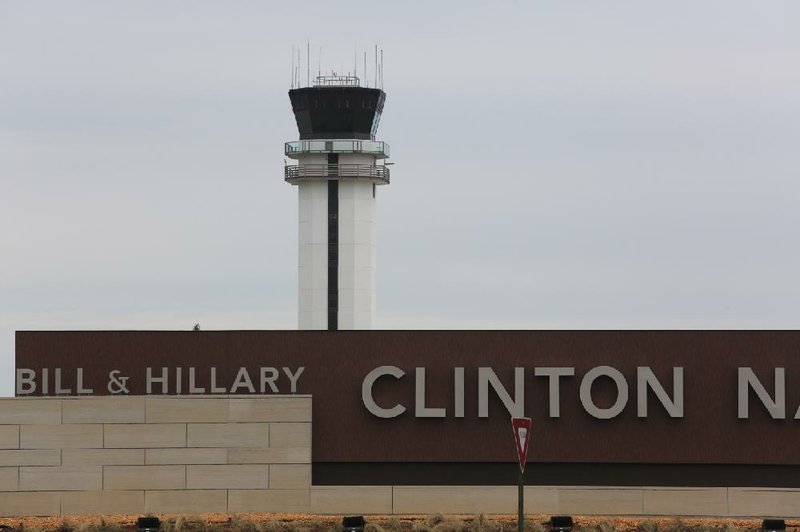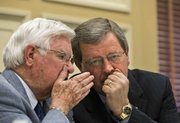WASHINGTON - The U.S. House passed legislation to end air-traffic controller furloughs, joining the Senate in letting the Federal Aviation Administration work around across-the-board budget cuts to end days of flight delays.
The House cleared the measure 361-41 Friday after the Senate unanimously passed the bipartisan legislation Thursday night just before a week-long congressional recess. The measure allows the FAA to move as much as $253 million within its budget to end furloughs.
The White House said President Barack Obama would sign the bill but condemned the piecemeal approach to alleviating the impact of automatic budget cuts.
“This is a Band-Aid solution,” said Jay Carney, the White House press secretary.“It does not solve the bigger problem.”
Flight delays since rolling furloughs of 10 percent of U.S. controllers began Sunday have become the focus of debate on the mandatory spending cuts known as sequestration and led to calls from airlines and airport operators for a solution.
“The administration and the FAA has refused for months to provide us with a plan, to work with the airline industry to figure out how this could be implemented without all this pain to the traveling public and the economy,” said House Transportation and Infrastructure Committee Chairman Bill Shuster, a Pennsylvania Republican, who voted for the plan. “I believe this has been mismanaged. I believe this will force them to stop these needless furloughs.”
House Majority Leader Eric Cantor, a Virginia Republican, said the measure allows the FAA enough flexibility to also avert the planned June 15 closing of 149 small-airport control towers operated by agency contractors.
However, it remained unclear Friday afternoon how the legislation will affect the impending closure of towers at Texarkana Regional Airport and Drake Field in Fayetteville. The FAA has said the federal contract towers at those airports will close June 15.
The legislation Obama is expected to sign Monday specifically addresses the furloughed air-traffic controllers at FAA towers. The contract towers are staffed by non-FAA controllers.
“Fayetteville and Texarkana are still hanging in the balance,” Steve Luebbert, the manager of Texarkana Regional, also known as Webb Field, said in an interview Friday. “We don’t know if [Transportation] Secretary [Ray] LaHood will take advantage of the budget flexibility with respect to the contract towers.”
Sen. Mark Pryor, D-Ark., issued a statement praising passage of the legislation as a “win for Arkansas,” but suggested issues remained.
“This is a good first step to keeping our towers open, and our skies safe,” he said. “The fight’s not over yet.”
In addition to the 15,000 controllers, the measure also will end furloughs of 11,000 FAA safety inspectors, technicians and others who perform essential services in the aviation system, Kori Blalock Keller, a spokesman for the Professional Aviation Safety Specialists union, said in an interview.
The union had been assured by FAA Administrator Michael Huerta that its members wouldn’t be furloughed if the bill was passed, Keller said.
“We obviously appreciate the fix, but we are looking at the long term,” she said. “We need a long-term fix to sequestration. This is by no means the end.”
The delays since Sunday show the need for fully staffed air-traffic facilities, the National Air Traffic Controllers Association union said in an e-mail statement after the vote.
“We applaud the bipartisan nature of the votes and look forward to working closely with the Department of Transportation and the Federal Aviation Administration to ensure the newly granted flexibility is exercised in a way that maintains our national airspace system’s status as the safest and most efficient in the world,” the Washington-based union said in the statement.
House Democrats decried the move to single out the FAA for budget relief while not changing across the-board cuts in programs geared toward the poor, such as Head Start.
“We ought not to be mitigating the sequester’s effect on just one segment when children, the sick, our military and many other groups who will be impacted by this irresponsible policy will be left unhelped,” Minority Whip Steny Hoyer, D-Md., said.
House Speaker John Boehner said the furloughs created havoc for travelers that were an invented crisis by Obama as he tries to get leverage in the broader debate to replace the automatic cuts with a debt-reduction pact.
“It’s unacceptable that the FAA chose not to plan for sequestration or utilize the flexibility it already has,” Boehner, an Ohio Republican, said in a statement after the vote. “Americans were rightly fed up, and it’s unfortunate that the House and Senate were forced to step in and fix the problem when the president chose not to act.”
Under sequestration, the FAA had to pare $637 million from its budget for the 2013 fiscal year, which ends Sept.30. The agency was achieving about $200 million of its required cuts by furloughing nearly all its workers - including the 15,000 air-traffic controllers - one day every two weeks.
A group representing large airlines heralded congressional passage of the FAA legislation.
“This measure ensures that air traffic controllers can return to work, and importantly return efficiency to the national air space,” Nicholas Calio, chief executive officer of Airlines for America, the Washington-based trade group representing the largest U.S. carriers, said in a statement.
At the same time, the Washington-based Airports Council International-North America, an airport trade group, said its response to the legislation was “bittersweet.”
“We are very disappointed that the Airport Improvement Program was used to pay for this fix, as these funds were paid by passengers to maintain and enhance airport runways and taxiways, not fund FAA operations,” said David Edwards, chief executive officer of the Greenville-Spartanburg Airport District in South Carolina and chairman of the trade group.
Halting the furloughs was the latest example of lawmakers easing parts of the budget cuts that became too painful.
They previously used a separate, wide-ranging spending bill to provide more money for meat and poultry inspectors. Attorney General Eric Holder cited extra funds in that same bill as the reason the Justice Department would be able to avoid furloughs. Transportation Security Administration employees also have gotten relief.
Obama and his Democratic allies want to roll back all of the mandatory cuts, with the White House proposing a substitute mix of spending cuts and tax increases that Republicans have rejected. The GOP has proposed replacing the across-the-board spending cuts with others, many of them aimed at programs Democrats defend.
Meanwhile, delays at major U.S. airports continued Friday.
Staffing shortages were blamed for delays in arriving flights at the New York area’s three major airports, LaGuardia, Kennedy International and New Jersey’s Newark Liberty International, according to the FAA’s travel website. The longest average wait time was 43 minutes, at LaGuardia.
Except for weather delays in San Francisco, other major U.S. airports were running normally, according to the website.
The FAA said the furloughs of air traffic controllers caused more than 863 delays Wednesday because of short-staffed radar rooms that handle high-altitude traffic in New York, Cleveland, Jacksonville and Los Angeles and at radar offices handling lower-level traffic around Washington, Dallas, Southern California and at a tower in Detroit. It reported more than 2,132 additional delays because of weather and other factors.
But the number of delays understates the inconveniences caused to passengers at airports, some of which were using public address systems to say the delays were caused by the automatic spending cuts required by the sequester.
The union that represents equipment technicians said Thursday that when part of the instrument landing system failed at Long Island MacArthur Airport, a Southwest Airlines flight had to be diverted to Baltimore this week. Normally such equipment is restored immediately,the union said, but because of furloughs, it was fixed the next day. It listed other disruptions because of delays in fixing broken equipment.
The FAA said Wednesday that there had been 1,025 delays Tuesday attributable to staff shortages and 975 delays from other causes, including weather. On Monday, the first weekday of furloughs, the agency said there were 1,200 delays because of short staffing and 1,400 because of weather.
Huerta on Wednesday told House appropriators he had no choice in going ahead with the furloughs of controllers under government wide budget cuts and said there would be “no effect on safety” for airline passengers.
The FAA administrator testified that he needed to look at controller salaries. Seventy percent of the agency’s operating budget is in payroll, and 40 percent of that amount goes to air traffic controllers, he said.
Asked whether he could concentrate furloughs at less-congested airports, Huerta said the FAA has to avoid picking “winners and losers” among airlines by sparing larger hubs.
Information for this article was contributed by Laura Litvan, Alan Levin, Mary Jane Credeur, Kathleen Hunter, Peter Cook, Ellen Uchimiya, Bernard Kohn, Mary Schlangenstein and Ed Dufner of Bloomberg News; by Alan Fram, Anfew Taylor, Joan Lowy and Nedra Pickler of The Associated Press; by Johnathan Weisman and Matthew L. Wald of The New York Times; and by Noel E. Oman of the Arkansas Democrat-Gazette.
Front Section, Pages 1 on 04/27/2013


